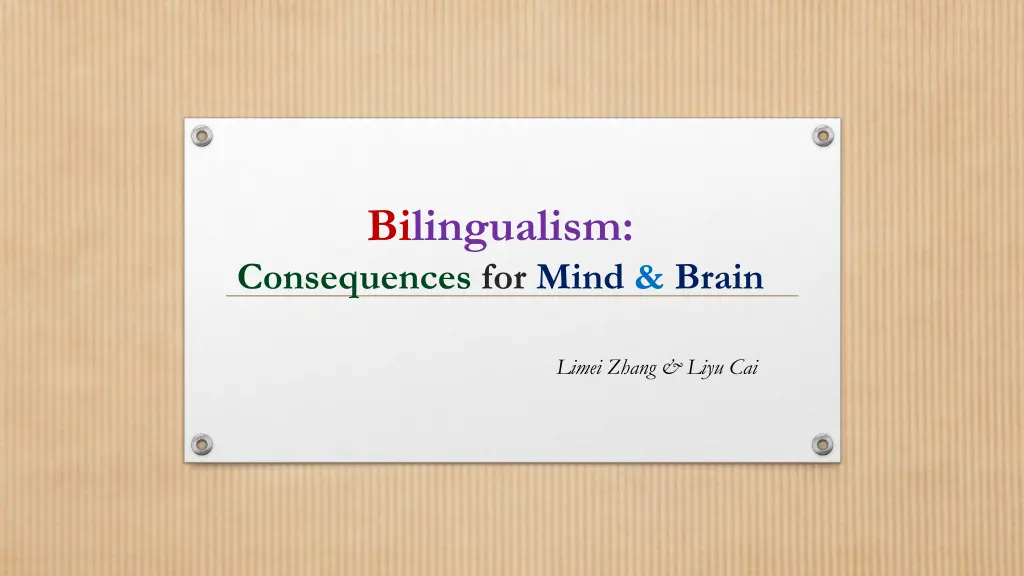
Exploring the Advantages of Bilingualism on Mind and Brain Function
Discover the advantages of bilingualism on cognition in adulthood through recent studies examining the effects of bilingualism on the mind and brain. Explore how bilingual minds process languages and execute executive control, leading to enhanced verbal skills, attention, and cognitive performance.
Download Presentation

Please find below an Image/Link to download the presentation.
The content on the website is provided AS IS for your information and personal use only. It may not be sold, licensed, or shared on other websites without obtaining consent from the author. If you encounter any issues during the download, it is possible that the publisher has removed the file from their server.
You are allowed to download the files provided on this website for personal or commercial use, subject to the condition that they are used lawfully. All files are the property of their respective owners.
The content on the website is provided AS IS for your information and personal use only. It may not be sold, licensed, or shared on other websites without obtaining consent from the author.
E N D
Presentation Transcript
Bilingualism: Consequences for Mind & Brain Limei Zhang & Liyu Cai
ADVANTAGES Of Bilingualism ?
? Bilingualism Dementia
Review recent studies: Examine effects of Bilingualism on cognition in adulthood; Explore possible mechanism for these effects Methods: Behavioral Neuro-imaging
What is Different about Bilingual Minds ?
Bilingual Children Symbol manipulation Reorganization Difference between form &meaning Ignore misleading information
Verbal Skills Executive Control Receptive vocabulary size High- level thought Picture- naming tasks Multi- tasking Comprehending &producing words Verbal fluency tasks Sustained attention
Evidence of Joint Activation Cross-language priming Lexical decision Patient studies Imaging studies
How is Executive Control Executed ?
Inhibition Local Inhibition Linguistic Performance Global Inhibition Linguistic Performance Cognitive Performance
Consequences of Joint Activation reduced speed of lexical access Linguistic outcome a role for activation Cognitive outcome enhanced attentional control
Conflict Tasks Measure of Attentional Control Flanker Task Simon Task Stroop Task
fMRI (Functional Magnetic Resonance Imaging) Blood-oxygen-level dependent signal
Brain Plasticity Grey Matter White Matter
Nature of Bilingual Advantages Evidences and counter-evidences
Evidences Evidence 1(empirical) to manage two jointly activated languages Better control of attention Evidence 2 other enhanced cognitive controls, such as LANGUAGE INHIBITION & CONFLICT MONITORING 1. older bilinguals outperform monolinguals in pure blocks of incongruent trials 2. Bilinguals outperform monolinguals in interference suppression task when there are bivalent stimuli(not univalent stimuli) 3. Later diagnosis of dementia, AD(https://www.youtube.com/watch?v=20Sn0qz8L_M) due to cognitive reverse or brain reverse
Bialystok, Craik, and Freedman s study on hospital record Discovery : With all the other factors equal or similar ,bilinguals tend to be diagnosed with dementia (AD, Alzheimer ) 3-4 years later than monolinguals, thanks to better maintenance of cognitive function in healthy aging and postponing the onset of symptoms by continually stimulating physical or mental activity. Reliability: replicated results done by various scholars among different languages Validity: predictors are kept being ruled out as contributing factors , i.e. education/social status/culture/immigration ,etc. Causality: irrelevant to good brain
Counter-evidences 1. ONLY proved by recurrent congruent/ incongruent trials 2. preverbal advantage of bilingual children 3. no advantage shown in low-monitoring required conditions 4. no advantage shown on response inhibition (univalent stimuli)
Preverbal advantage of bilingual infants No confusion over languages Phonic discrimination ability Phonic discrimination ability over Non-acoustic properties of language (renewed attention by bilingual infants of 8-month old) Better perceptual attentiveness to won visual rewards
Controversy over bilingual advantage As Cozalto and his colleagues pointed out : bilingual advantage is not due to the constant exercise of inhibition, but that learning to keep two languages separate leads to an improvement in selecting goal-relevant information from goal- irrelevant information Bilingual advantages are not fully discovered except for monitoring or difficulties conditions Specific task and precise language histories need to be studied
How bilingualism ?the possibility of a cumulative benefit for multiple languages. (multilinguals>bilinguals VS bilinguals>monolinguals) ? the degree of bilingualism required for these benefits to emerge. (no single factor decisive, i.e. Age, Fluency, Literacy, etc. ) ? Whether the similarity of the two languages matter(Spanish-English VS English-Chinese)
Conclusion As Peal and Lambert concluded :bilinguals have mental flexibility, meaning a superiority in concept formation and a more diversified set of mental abilities. Bilinguals outperform in inhibition, selection, switching , sustaining attention, working memory , representation and retrieval. Fear and anecdotes served as counter-evidence to show that bilingualism may bring in retardation, academic struggle and language confusion. There is still much we do not know about the effect of bilingualism on the mind, the neural correlates of those effects, and the causal components of the experience that lead to them .
Questions From your own experience , did you experience TOT phenomenon in using a language while the equivalence in another language emerged? Do you think you have a good inhibition ability to control it? Do you believe the multicompetence /bilingualism brings in retardation or personal struggle? Share your story or any anecdote.




















